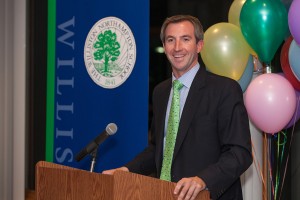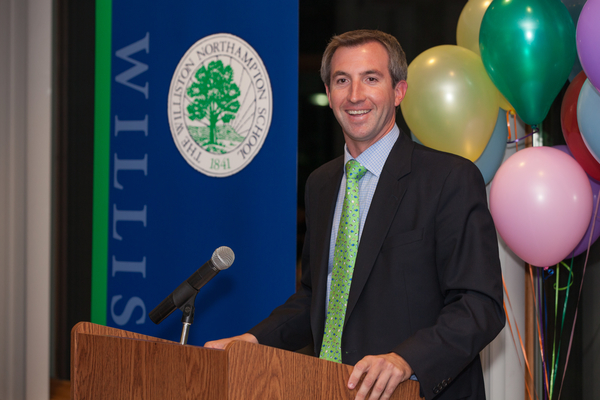Remarks delivered at The Williston Northampton School’s Senior Dinner on September 14, 2012, by Tim Murphy, Director of Placement at The Fessenden School.

Thank you Mr. Hill, Elizabeth D’Amour, faculty, and members of the Class of 2013. It is hard to express, after spending 13 years of my life at Williston, what it means to me to be invited to speak to you today. I don’t think I’ve been this nervous since my freshman English class in 1992, when I addressed the assembled school community in the Chapel about Gov. Bill Clinton of Arkansas!
When I told my dad in passing a few weeks ago that I’d be speaking at Williston, he became quiet and looked out the car window for a few moments. He then recalled dropping me off outside the Williston Middle School on my first day of 7th grade in 1990. As I walked, apprehensively, away from the safety of his car and towards that front door, I stopped, briefly, turned back, and shot him a nervous smile, feigning confidence and enthusiasm. My dad, not believing my face for a second, prayed that I would survive. “That you would thrive,” he told me later, “didn’t even occur to me. I only wanted you to survive.” Survive I did. And if you will indulge me a brief trip down memory lane, I’ll give you some background.
The Director of the Middle School, with whom I immediately connected, was a kind man from Zimbabwe named Desmond Pullen. My math teacher was the ever-patient, always positive, Mimi King. My English teacher, who pushed me hard to become a good writer and forever eradicated the word “um” from my vocabulary, was Paul Sonerson. Sitting in the classrooms of these dynamic teachers, I soon forgot about my unhappy elementary school experience in a rigid parochial school, and reveled in a school environment where teachers sought my opinions, joined me at my lunch table if I needed extra help, and delighted in my quirky sense of humor. I was hooked. My life would never be the same again.
Over the course of the six years that followed, I continued to thrive at Williston. I built strong relationships with many different teachers, formed deep and meaningful friendships with my classmates, and tried new sports. One year, I even tried acting in a play to avoid a winter sport. What I discovered that winter was a love of acting and theater that fulfilled the creative side of my soul for many years to come. At the heart of each of these activities, there was always a teacher. Someone who saw something in me and pushed me until I saw it myself.
In 9th grade, I went out for the cross country team. It was there, at my first practice, that I met Al Shaler. I was terrified. Most of you may recognize him as one of the jovial retirees that, I hope, still gather frequently for coffee in the StuBop. But during those first few moments of cross country season, I encountered a loud, pipe-smoking, hard-driving coach that called us things I would surely be fired for saying today!
That I returned for a second practice was a miracle, as more than a few guys did not. It didn’t take me long, however, to realize that underneath Mr. Shaler’s raspy, booming voice was an enormous heart, and a belief that we could do great things. Within a few days of that first practice, it became clear that sailing over roots and rocks in wooded trails at a high speed required a fitness and a finesse that my body did not yet possess. Exasperated after my umpteenth injury, Mr. Shaler blurted out my new nickname: Feet! It wasn’t cool, to be sure, but it was all mine. I had a nickname. I belonged to something.
In the spring of my sophomore year, I was walking back to the day student lot from the gym after lacrosse practice. As I came up the hill behind Reed and was about to round the corner toward the Victory Bell, a head shot out of a Dodge Room window above me. It was Dick Gregory, founder of The Caterwaulers. He had heard me singing to myself. “You! Come up to the Dodge Room right now,” he chirped at me. Mortified, and wondering what I had done wrong, I entered the building. When I walked into the room, the members of the group, all juniors and seniors, were gathered around Dick, who sat at the piano. “Sing this,” he instructed, before rattling off a few chords. Without thinking, I followed suit. After a few minutes, he announced, “There, it’s settled. Welcome to the group. Oh, and what’s your name?” I wandered out of the building in a daze of both confusion and excitement. Had Mr. Gregory not acted spontaneously in that moment, I don’t know if I ever would have had the guts to audition for an a capella group. Again, I felt connected to something.
During my senior year, after acting in several plays for Ellis Baker, he sat me down to tell me that he was contemplating a production of Sweeney Todd for the spring musical. “It’s going to be huge,” he said, his eyes wide with excitement. “And you are going to play Sweeney.” I had never been a lead, and now he was asking me to not only play the lead, but to sing a dozen solos. Again, I was frightened. Again, I was pushed.
Today, I work at The Fessenden School in Boston, the nation’s oldest all-boys junior boarding school. (Which means, of course, that I am partly responsible for Omash. You’re welcome!) As Director of Secondary School Placement, it is my job to know my students well, and to help them imagine what their lives will be like at their next school. In every one of those conversations, I think about Williston, and what it meant to me.
My senior year was among the most wonderful of my life. Never before had I worked so hard, risked so much, or relied more heavily on my teachers and friends. My days were jam-packed: AP classes, sports practice, dinner on campus, Caterwaulers rehearsal at 6:30, followed by play rehearsal at 7:30. On a good night, I’d be in my trusty Volvo by 9 pm, heading home to start my homework. My memories of my final year are spotted with triumphs. Finishing near the top of my team in every race. Standing on the stage at the curtain call of Sweeney Todd, my heart pounding. Singing with The Caterwaulers in our final concert after Baccalaureate. Seeing my parents in the front row, beaming.
My connection to Williston continued when I was hired to work here right after college, in the alumni office, and, later, the admission office. To return to a place that meant so much to me was a thrill. Working at Williston never felt to me like work. I can remember signing my contract each year and writing “thank you!” on it. (That was before I realized you could negotiate salaries!) Last summer, I read a quote from a Buddhist text that summed up my experience at Williston (and at Fessenden and Camp Becket where I now work), nicely:
The Master in the art of living makes little distinction between his work and his play, his labor and his leisure, his mind and his body, his education and his recreation. He hardly knows which is which. He simply pursues his vision of excellence in whatever he does, leaving others to decide whether he is working or playing. To him, he is always doing both.
I lifted that quote from the book Shine, by Dr. Ned Hallowell, which was our faculty summer reading. In it, Hallowell, a psychiatrist and expert on ADHD, stresses that all people need to feel a part of something larger than themselves. Social isolation, he says, is as dangerous as cigarette smoke. Connection is essential. And if you like yourself enough, you will connect with the right people.
One of the reasons that I give to the Annual Fund at Williston is because this is the first place where I felt connected to something larger than myself. I can assure you that I am not standing here because I am a major donor. My gifts are small, but consistent. It’s the only quantifiable way that I can be sure Williston knows that it has made a difference in my life.
In seventh grade, Paul Sonerson introduced me to my favorite writer, Kurt Vonnegut, Jr. I love him because he writes things that, to me, are simple, funny, and deeply true. “Community,” Vonnegut once said, “is all that is important about what we create, or maintain, or defend in this world. All the rest is hoopla.”
To the Class of 2013, do not rush to the finish line. Take your time. Push yourself.
My hope for each of you is that you all find that balance between work and play. I hope you connect; with your teachers, your coaches, each other, and this school. Have an incredible senior year. Thank you.


